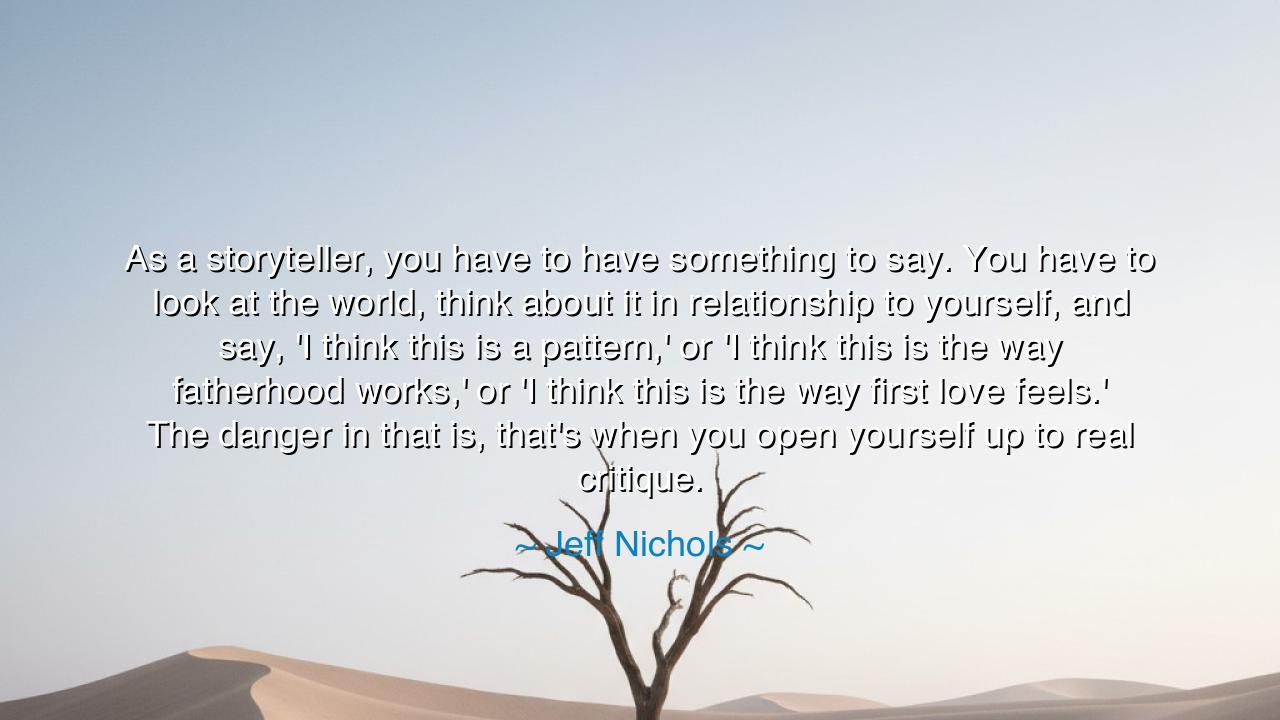
As a storyteller, you have to have something to say. You have to
As a storyteller, you have to have something to say. You have to look at the world, think about it in relationship to yourself, and say, 'I think this is a pattern,' or 'I think this is the way fatherhood works,' or 'I think this is the way first love feels.' The danger in that is, that's when you open yourself up to real critique.






Hearken, children of the ages, to the words of Jeff Nichols, the sage of narrative and reflection: "As a storyteller, you have to have something to say. You have to look at the world, think about it in relationship to yourself, and say, 'I think this is a pattern,' or 'I think this is the way fatherhood works,' or 'I think this is the way first love feels.' The danger in that is, that's when you open yourself up to real critique." Here lies a teaching of courage, insight, and the sacred art of expression: to speak is to expose the soul, to share understanding, and to invite reflection.
Know that in these words there is both humility and bravery. To be a storyteller is to examine the world through the lens of the self, seeking patterns, truths, and insights that may illuminate the human condition. Nichols teaches that the act of observation is inseparable from interpretation; the storyteller does not merely report, but perceives the hidden currents of life and translates them into narrative for the benefit of all who would listen.
Yet, consider also the peril in such openness. To voice what you see, to declare what you feel about fatherhood, love, or life itself, is to stand vulnerable before the judgment of others. The ancients would counsel that wisdom without courage is inert; to expose insight is to risk critique, yet in that exposure lies the power to teach, move, and transform. The storyteller, like the prophet, invites both illumination and scrutiny.
And behold, there is heroism in this endeavor. To observe, to think, and to speak is to embrace the responsibility of insight, to wield the power of narrative with conscience and care. Jeff Nichols’ wisdom teaches that patterns discovered through reflection, and truths expressed through the voice of the self, are gifts both to the storyteller and to those who receive them, even when the reception is tempered by challenge or criticism.
Thus, remember, future generations: to craft a story is not merely to entertain, but to confront the world with honesty, perception, and empathy. To explore relationships, to illuminate love, to render the nuances of fatherhood, and to discern patterns is to participate in the eternal dialogue of human understanding, even as one opens oneself to critique.
In the end, the ancients would say: speak with courage, observe with attentiveness, and share with heart. For the path of the storyteller is both perilous and sacred; it is through vulnerability and insight that wisdom passes from one generation to the next, and through the courage to say what is felt that the human spirit is both challenged and elevated.






UDGia Uy Dinh
Nichols’ quote brings to light the tension that many storytellers face—balancing personal insight with the risk of being critiqued. But do we create our best work when we’re most vulnerable, or is it better to keep parts of ourselves guarded to avoid judgment? It makes me wonder how much of a storyteller’s self-awareness comes from the courage to expose their thoughts, and how that vulnerability shapes the stories they tell.
0S02 Sus
What strikes me about this quote is how it frames storytelling as a reflection of the storyteller’s personal journey. But isn’t it also true that the best stories often transcend the individual and touch on universal experiences? At what point does a personal story become so unique to the storyteller that it loses connection with others? Is that what makes it special, or does it make it harder for others to connect?
HHHa Hoang Hai
This quote perfectly sums up the risk involved in storytelling. When you start putting your own perspective into your work, it opens up the chance for others to question or criticize it. But can critique actually be a good thing? Does it help shape the story into something more meaningful, or is it a sign that the story is too personal to be universally relatable? How do you handle the pressure of external judgment?
TNtun ngan
Nichols’ quote resonates because it highlights the challenge of being a storyteller—how do you share something that’s deeply personal yet still relatable? The idea that storytelling invites critique is powerful. How do you handle critique when you open up parts of yourself in your work? Does it make you more committed to your truth, or does it make you question the value of what you’re saying?
PNPhat Nguyen
I agree with Nichols’ point about storytelling requiring personal insight, but it also makes me think—how much of our own perspective should influence the story? At what point does the story become more about us as storytellers than the experiences we’re trying to share? Can we truly step outside of our own biases to create something that feels universally true, or are we always tethered to our own experiences?